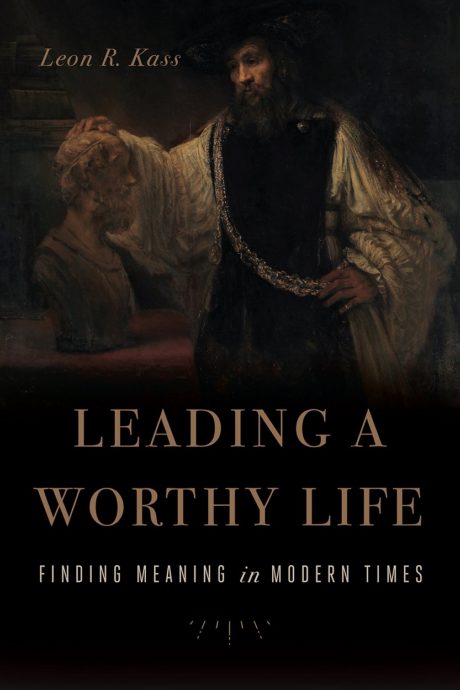Harvey Mansfield is searching for the enduring sources of law in a republic?
How to Essay the Upright Man
How should we think about the good life? A proper understanding of human flourishing needs an account of human nature in its metaphysical context. This kind of moral anthropology makes possible judgments of moral excellence. Thus, to “what is man,” the Psalmist answers, he whom God made “a little lower than the angels” and “crowned” with “glory and honour.” Man officiates other creatures due to his godlike origins. Here, human purposes evince natural law: “the heavens declare the glory of God” and “the firmament sheweth his handiwork.” Both reflect the “law of the Lord, converting the soul.” Human dignity has this larger context in man mediating heaven and earth under God. This Biblical account finds echoes in pagan sources.
Ethics accordingly means an orientation to a higher cosmic harmony. “Upright man,” Ovid verses, “made in image of commanding Gods,” alone has rectitude to gaze at heaven: “On earth the brute creation bends its gaze, but man was given a lofty countenance” and “commanded to behold the skies” so he “with an upright face may view the stars.” As with the Psalms, so also here moral anthropology takes on a cosmic scale. These spheres, Plato, Dante, and Shakespeare deemed, play music in mathematically governed motions whose harmony orders our loves and thoughts. Our wonder at the heavens with upright posture signals our fusing the spiritual and physical. Humanity has moral life in standing righteously before God.
Science and the Good Life
These premodern writers, from David to Ovid and onwards, understood the significant connection between a man of understanding and what he stands underneath. That is, upright character was more than mere figurative expression. But modern writers thought differently. The new science revised the metaphysical context that gave meaning to human life. So Pascal mourned, “The eternal silence of these infinite spaces frightens me.” What changed? Well, our place in the universe swerved when the early moderns reconceived science and art to conquer nature for improving life. Nature went from a God-given harmony for human contemplation to a material nemesis with secrets for human mastery. Nature was rethought, and with it, human nature. Men mastered nature to live as equals, yet morality means distinguishing high from low, noble from base. How should we rethink the good life given modern science?
Perhaps one can accept the mathematical success of modern science, but attempt to moderate its soulless effects in the political applications of modern technology. One tradition of thinkers, from Hans Jonas in The Phenomenon of Life to Erwin Strauss in Phenomenological Psychology, do not rehash old natural law theories, but begin with the moral significance of our embodied experience in order to account for the good life in an age of science. Given our colossal technological powers, rethinking dignified human freedom must be in terms of life as lived. The wonder at being in David and Ovid needs rediscovery. This phenomenological approach to human matters is a renegotiated natural philosophy. Leon Kass is one proponent, whose writings essay what worthy living means given democratic equality and biotechnology.
Once, “a man of the left and of the Enlightenment,” his friend Harvey Flaumenhaft explains, Kass had “unthinkingly” assumed that “education and progress in science and technology” meant “humanity at last” would “become the society of superior creatures” which “nature’s stinginess, social oppression, and religious credulity” prevented. Raised in a Jewish immigrant family, Kass learned from parental example that education was no substitute for character. But his parents’ socialist morality did attempt to substitute for religion. His studies magnified this issue of decency versus progress. Classically educated and medically trained at University of Chicago, Kass befriended Flaumenhaft there. This friendship would soon affect a turning in Kass with regards to his lifelong moral reflections upon science and politics.
After medical school at UChicago, he sought doctoral study in biochemistry at Harvard. There, Kass experienced the golden age of molecular biology, but midsummer 1965, he interrupted his research to help the Civil Rights Movement with his wife, the late Amy Kass, in Holmes County, Mississippi. Living with a farming couple in a rural home lacking in modern amenities, they visited families, shared in their activities, and aided voter registration. His return home to Cambridge forced contrasts in his mind. He had found more honor, dignity, and decency among the poor, uneducated black farmers of Mississippi than among his prosperous, educated colleagues at Harvard. Sharing their progressive opinions, he averred their arrogance.
Then, in summer 1966, Flaumenhaft moved next door. He planned to assign for fall courses at a nearby college Aldous Huxley’s Brave New World, C.S. Lewis’ The Abolition of Man, and Jean-Jacques Rousseau’s Discourse on the Sciences and the Arts. Flaumenhaft urged Huxley and Lewis upon Kass, and together they read Rousseau. These three authors transformed his outlook. Kass thereby found clarity with the issues perplexing his mind, from the moral costs of scientific gains, to how technological benefits erode human freedom, along with the incomplete accounts of modern science. With this catalyst, Kass moved from science to the humanities as a renowned teacher of great books and applier of their wisdom.
His writings assume modern troubles have existed for countless generations. Our proper concern is not, Yuval Levin notes, “with the latest modern excess, but with man’s unchanging nature, wants, needs, and potential,” all rooted in the “question: How does man thrive?” Thus, his first book, Toward a More Natural Science (1985), sought “the philosophical reconstruction of natural science” and “renewal of natural philosophy,” as The Public Interest put it. Next came The Hungry Soul (1994), about how proper human eating illuminates ways of civilizing our creaturely nature. Later, he debated bioethics more extensively in The Ethics of Human Cloning (1998) and Life, Liberty, and Dignity (2002), and also co-edited with Amy Kass, Wing to Wing, Oar to Oar (2000) and What So Proudly We Hail (2012, also co-edited with Amy Kass and Diana Schaub), anthologies on courtship and marriage, and American patriotism. Kass drew from both Athens and America.
Kass practiced what he wrote as Chairman of the President’s Council on Bioethics. The “Kass Council” had experts vivaciously discuss disagreements and issue rigorous reports from rich disquisitions about what science can say on what man is. Mandated to publicly educate by developing national dialogues on bioethical controversies, the Council used Socratic method to illuminate mutual disagreements. Their misunderstood success was due to the fact, “with that Socratic second mandate in mind,” the late Peter Lawler recalls, “President Bush chose for his first chairman a man trained in medicine, natural science, and the wisdom about being human embodied in the Great Books from Plato through Shakespeare to Genesis—Leon Kass.”
Teaching and Learning
Not only a thinker about natural science, Kass is also a natural teacher. Once briefly a tutor with Flaumenhaft at St. John’s College in Annapolis, he returned to his hometown of Chicago and taught with Amy Kass at their alma mater, the University of Chicago, teaching both undergraduates and graduate students, especially with The Committee on Social Thought. There, Amy and Leon Kass were renowned for their partnered seminars. (Theirs was a marriage of true minds.) Texts taught in his classroom further altered his life, from the Ethics of Aristotle to the Book of Genesis, from the Critiques of Kant to War and Peace by Leo Tolstoy. There, he learned to draw from both Athens and Jerusalem. His longtime class on the Book of Genesis became his book, The Beginning of Wisdom: Reading Genesis (2003), a commentary upon the first book of the Bible, understood as a philosophical text meditating upon human nature. (An sequel manuscript of a commentary on the Book of Exodus is also in the works.)
Consider Cain. After his exile East of Eden for murdering his shepherd brother Abel, he, a farmer, builds the first city which he names after his son, Enoch. This Neolithic Revolutionary is the first agrarian, murderer, and political founder. The impulse for fratricide ties to political founding, as these two are the twisted roots of human civilization. In his line includes its seventh man, Lamech, the first polygamist whose sons invent civilizational tools. After winning the first combat, Lamech brags to his wives, “If Cain shall be avenged sevenfold, truly Lamech seventy and sevenfold.” Note the number. In seven days God created the world and rested. But this seventh man of creation inverts the whole: his innovation is a rebellion of murderous urbanism that runs through human activities from Babel to Sodom and Gomorrah. “The city of fear proudly begets one of heroic ambition,” Kass writes. “There is a direct line from the plowshare to the sword.” Moral troubles coincide with technology from the beginning.
Modern woes intensify through scientific technology threats to our dignified freedom. Science manifests “what’s dignified about our humanity,” Kass explains, but “you cannot be simply for freedom.” It “is in danger of destroying its foundation” if left without “some view of dignified humanity” which is understood as “a way of being in the world that treasures” real life, friendship, love, and work, along with loyalty and devotion to community, as well as “awe and reverence for the fact that the gift of this life is ours not because we had it coming.” If we are created equal, the emphasis is on the adjective: we creatures dependent upon higher powers. But these old fashioned notions have the lesser hand in a liberal democracy disoriented by digital technology.
This subject Kass engages in Leading a Worthy Life (2017), his latest book, his most comprehensive essay collection, and probably the best introduction to his larger corpus. Always lurking are Huxley, Lewis, and Rousseau. In contrast to a soulless science of life, Lewis inspires the pursuit of a natural science truer to lived life. To avoid the practical danger of dehumanization from the relief of human estate sacrificing the high for the urgent, Huxley inspires the pursuit of a richer account of dignified human flourishing. And, against the social and political dangers of cultural decay and enfeeblement, Rousseau inspires the pursuit of a cultural teaching for strengthening our hearts and souls beyond strength in body and wealth. All three Kass uses as prophetic voices who point to an alternative way of liberal learning, doing science, human civilizing, and self-government that ennoble rather than debase humans.
This theme is common to all three muses: all men have an innate capacity to stand up for themselves, yet nothing in their nature requires it. It is not inevitable for human beings to fight for their right and duty to live the good life. The upright posture of a human being fundamentally changes his orientation to the world, at all levels of his humanity raised from mere animality to embodied godlikeness. Mere existence as an animal is cultivated into true humanitas. That is, Kass seeks a more natural humanism. Our godlike peaks of human flourishing we find in the morally exemplary character which shows forth in beautiful deeds. We can discover it in the philosophical inquiry of truth-seeking conversations. Being a human being means striving to achieve excellence in virtues and thoughts, deeds and words. There is a basic dignity in us as mere human beings, and the heights of our being human in its fullness. The latter means assuming the costs of wagering greatness, yet modern technology is purposed to ease the burdens of life. The potential contradiction flows from this point: We can be active participants in learned practices, not passive subjects of biomedical technologies. However, will we?
Excellence and Human Desire
Great human achievements flow from this striving for excellence. Rather than just exertions of good character against hardships, human effort is important in how it manifests the alert, self-experiencing agent whose deeds flow intentionally from his willing, knowing, embodied soul. This soul is not isolated behind screens, but subsists in friendship of living community and living books. The natural way for a human to be in the world is to practice humanity as a virtue. Being human is our humanity-at-work, a creaturely flourishing in rhythmed time of shared practices particular to the kind of dignified beings we are. Yet the very mention of “dignity,” Kass bemoans, sounds too aristocratic for any egalitarians and too religious for any secularists and libertarians among us. It seems an outdated concept, especially in this century.
Kass says, “I seek to provide an articulate defense of what many Americans tacitly believe or seek in their heart of hearts but have forgotten how to articulate or defend.” The book makes a cumulative case for a moral anthropology across many subjects. He begins with essays on the permanent desire for authentic love, family, and friendship, against the challenge of isolation fostered by the sexual revolution and digital technology. Then, he moves onto the independence of humanizing practices, from medicine to baseball, against the biotechnical enhancements that threaten our condition. The latter essays consider the purpose of liberal education – to free us from immediate concerns and appetites in order to pursue truth by asking ultimate questions for their own sake. Since time is short, the great books are the best modicum to develop thoughtfulness, an intellectual virtue that aids developing good citizens. Finally, he concludes with essays on Athens, Jerusalem, and Gettysburg, specifically, with exegeses on Aristotle’s Ethics, the Decalogue in Exodus, and Lincoln’s Gettysburg Address.
The Ethics begin with a question: what is happiness? Yet they then turn not to argue for the virtues so much as to showcase their moral beauty in order to convert the reader. After “this museum of virtues,” Aristotle looks to the friendship of virtuous men, and, ultimately, the intellectual friendship of the philosophical life, funnily enough exemplified between Aristotle and his reader, if only to prove the point. After these topics, Kass examines the magnanimous man, who is the peak of moral nobility, in connection to politics. Sometimes great souls are called to office for political crises, even in egalitarian democracies. Here, Kass fittingly finishes with a discussion of Sir Winston Churchill. He, in the quoted words of Leo Strauss, recalls to teachers and students of political science the peaks of human excellence. These train all persons to see things as they are, in their greatness and misery, excellence and vileness, nobility and triumphs, so as to never mistake brilliant mediocrity for true greatness, moral and political.
This Great Book about inculcating character, the power to choose the good, is however not enough. The Good Book proves also necessary. Given to found the People of Israel, nearly all the ten statements of the Decalogue are formulated in the negative. All show that, “Human beings it seems are more in need of restraint than of encouragement.” If the Ethics encourage us to live well, the Decalogue restrains us to avoid idolatry. The “commandments” move from duties owed to God, to duties owed to fellow citizens. The underlying philosophy, beginning with the Prologue, is that “these are basically two great alternatives: either live freely in relation to the Lord, in Whose image humankind was created, or be a slave to Pharaoh, a human being who rules as if he were himself divine.” Either worship God in communal freedom, or else be in bondage to Egyptian comfort. Kass gives special focus to the statements with the most exposition, specifically in the injunctions for honoring the Sabbath along with mother and father. These words of God indicate a constant choice all souls face, between God and Pharaoh: “There will be perversity in every generation, but the world overflows with hesed or grace.”
Moral excellence and covenantal founding can coincide. In this funeral oration by Abraham Lincoln, a magnanimous statesman presents a new covenant for a wartime country. Intended to craft a canonical text for American civil religion, Lincoln reinterprets the American founding in the Declaration, construes the war as a test of that founding, and radically calls for our nation to be born again by passing that bloody test in pursuing equal liberty for all men. Here, as elsewhere, Kass brings his best game when interpreting classic texts. This one, which every American should know, is opportune for his phenomenological mode of inquiry that uses a continual reading of the ancients, both philosophical and religious, to address our experience of modern things. Ancient wisdom can help souls adrift today who need to learn how to look up. Lincoln argues, by dedication to justice, we living souls become new fathers to the nation. Likewise, this book is a wonderful addition to how we can, under God, stand up to see the stars.


